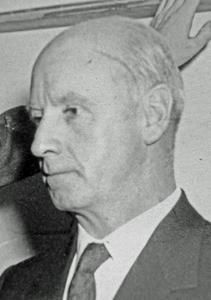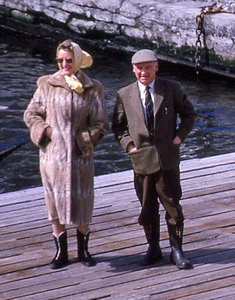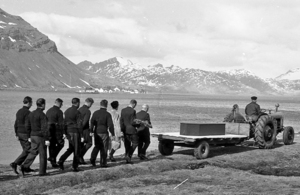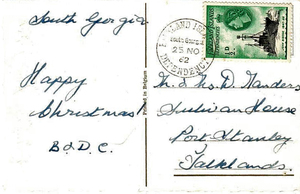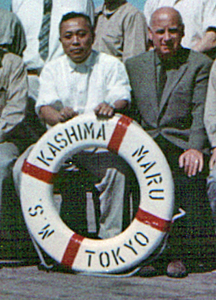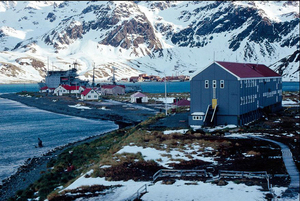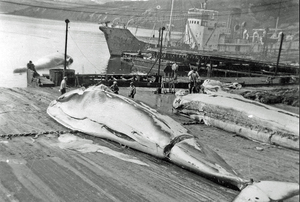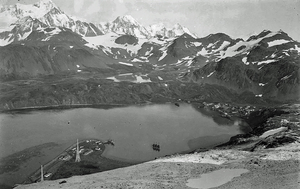COLEMAN, DENIS JOSEPH
1915-1990 from Ireland
master mariner and government administrator at South Georgia 1959-1969, was born at Cork, Ireland on 7 October 1915, the son of Patrick Colman, a cooper and his wife Catherine née Hutchinson.
Denis Coleman was educated at the Christian Brothers North Monastery, Cork and in 1934 became an apprentice with the London based shipping company Watts & Watts. After attending the Irish Nautical College in Dublin and a period as a Junior Pilot with the Cork Harbour Pilot Service, he joined Shell-Mex BP in 1940 as a second officer serving in their tanker fleet, progressing to first officer by the end of the war. In 1948 he joined Bowker & King of Leadenhall Street, London as master, moving to Esso Petroleum a year later as first officer then master, having obtained his master’s certificate in 1950.
In February 1959, Coleman, then residing in Bournemouth, applied for, and was appointed Administrative Officer at South Georgia at an annual salary of £1,100 plus an entertainment allowance of £100. He was considered a very suitable individual, as apart from his master’s certificate he held radar and radio-telephony credentials. As the government Administrative Officer and Magistrate, he also inter alia held responsibilities as Collector of Customs, Postmaster, Registrar of Shipping and Receiver of Wrecks, Registrar of Births, Marriages and Deaths and for ensuring that all the whaling and sealing laws and other legislation affecting the colony were duly complied with. Coleman also conducted any funeral services which were necessary.
Coleman and his wife Elizabeth Anne ‘Betty’ née Gurney (born 8 January 1917) took passage to South Georgia in May 1959 aboard the Blue Star liner Argentina Star to Montevideo where they joined the RMS Darwin for onward passage to Stanley and South Georgia. They reached King Edward Point (KEP) on 24 June 1959, where there were approximately 25 government staff in residence.
Coleman arrived at South Georgia when the whaling industry was in its final phase of activity prior to the complete closure and abandonment of the active whaling stations by 1965, due to the collapse in the whale populations. Whaling from the island had started in 1904, and the rapid expansion of the industry was one of the principal reasons why the government had appointed the first administrative officer in 1909. In the period Coleman was in office, he oversaw an important transition in the island’s history, but before that finally took place, he had to deal with several taxing issues relating to it, with over 1,500 men at work at three stations during the whaling season, and much associated shipping activity.
In May 1960 Coleman was called to resolve sensitive insurance and health and safety issues with Lloyd’s local agent and the ship owners when the Grytviken transport ship Calpean Star struck the bottom in Stromness Bay leaving her in a crippled condition with 167 whaling men, 58 crew and some 5,800 tons aboard. It was an issue that Governor ARROWSMITH recorded Coleman had handled very competently. Coleman also had to oversee the arrival of Japanese whalers at Grytviken and Leith Harbour from 1963 until their final withdrawal in 1965, and the activities of Soviet krill and fishing trawlers in the post-whaling period.
Captain Coleman and his wife became legendary at South Georgia. They lived a somewhat ‘independent life’ distant from the remainder of the community at King Edward Point, maintaining a strict authoritarian regime over the area and people they administered. This behaviour did not enhance their popularity. Mrs Coleman, who enjoyed cocktails when in important company, was otherwise of a reclusive nature. She became renowned for her airs and graces. When attending a film show at the Grytviken Kino, the Colemans sat separately, and the show could not begin until they were seated. They also did not permit the remainder of the government staff to collect their weekly supply of food from the store unaccompanied.
Jan Cheek, lived on South Georgia as a child during the period that Captain Coleman was the Administrator. Her father was Basil BIGGS, who worked on South Georgia as policeman/handyman from 1954-1969. Jan recalls:
My impression was that Mrs Coleman was considerably taller than her diminutive husband. I met them when home from the Falklands for my last long summer holiday on South Georgia in the late 1959/early 1960, before taking up the scholarship I had won to a Dorset grammar school. I particularly recall it because of Mrs Coleman’s congratulations when we received the news – this was the only time she spoke to me. They were clearly not ‘outdoorsy’ people, so our paths rarely crossed.My next visit was June of 1966 before I headed off to the UK, this time on a Commonwealth bursary to qualify as a teacher. I just glimpsed them across a room. By then it was clear … that they had a poor relationship with staff on KEP … My parents held similar views of the Colemans, but my father had to work for him, so he had a cool but polite relationship with Captain Coleman.Early in his time on South Georgia Coleman, or possibly his wife, decided their accommodation was not grand enough and a new administrator’s residence was commissioned at the same time as Shackleton House which was to replace the single men’s accommodation at Discovery House. I have copies of most of the colonial reports for FI and Dependencies for the period which show expenditure on the two buildings of £179,163 (1962/63 report) and a further £15,225 (1964/65 report). This was a vast sum at 1960s prices, and it tallies with the story circulating at the time at the that the two upgrades left little change from quarter of a million pounds. All this at a time when whaling, the main revenue source, was in sharp declineI think perhaps the Colemans did feel that they should not mix with the others on KEP. Certainly, previous magistrates were more sociable and hospitable. Was it a belief in their social superiority, simple diffidence or something more complex? I have not met anyone who got close enough to find out, but I feel they must have been very isolated in their splendid new house, especially Betty Coleman, who rarely emerged. At least her husband walked to the office every day where he would have had the company of the customs officers of the time, and I recall most were very affable types.
On his return to the UK Coleman gave an interview with CARA, the in-house magazine of the Aer Lingus airline. Coleman’s style of management with community at KEP can be clearly seen in these remarks:
'Being employees, it was rather difficult to get them on a community basis because they could always retire behind their jobs … So, I went in and said, “All hands out today, and we’ll clear the place starting at one end”. We had a little truck, and we collected all the rubbish and cleaned the place up generally … But we decided that we should get to know them better so I would carry out a seagoing procedure and have an inspection once a week in Discovery House and generally see that they kept their rooms clean'..
Coleman was proud of his achievements at KEP:
[The] Government station was very dependent on the whaling stations, particularly the one at Grytviken … I considered this a bad thing because we weren’t self-sufficient. From then on, we built up the power station, and workshop, so that we could do our own repairs. I could see the day coming when the [whaling] stations might cease to operate and then we would be able to carry on without their assistance. By the time I left we didn’t need for anything. Whaling had, in fact, ceased, and we were still quite capable of looking after ourselves.
Coleman did not endear himself to several of the British Antarctic Survey staff who arrived on the island from 1967 onwards. Two former BAS staff members recorded their impressions of Coleman, as part of the BAS Oral History Project. John ‘Golly’ Gallsworthy, who served with BAS from 1967-1976 at Halley Bay and South Georgia, in various capacities as carpenter and builder commented:
'From the days I lived in the Falklands, everybody wanted to go to South Georgia to work, despite the manager there: a chap called Coleman. Nobody liked Coleman; he was a bit like the ‘king of South Georgia’. What he said, went. I think he could be bloody difficult too. ‘King Coleman’ they used to call him, but everybody wanted to go there'.
Professor David Walton, who worked in BAS as an ecologist for forty years, starting in 1967, commented about his first arrival at South Georgia:
'The first time we went down, we were there for a summer because in those days (this is ‘67/’68), the island was run by the Falkland Islands Government and so it had a civilian population led by Captain Coleman and his wife. And there was Basil BIGGS and his wife there as the policeman cum handyman cum everything else. And there was a radio operator and an assistant who was drunk most of the time. It was a little microcosm of the British Empire with Captain Coleman … he presided over this, and we occupied Discovery House, which was the old building, built in 1925 for the Discovery Investigations. We turned that into our laboratories, and we operated from there for the summer. … But in 1969, with no more whaling ... the Government decided to cancel the contracts of all of its employees, and we took over the King Edward Point complex of buildings and … we basically turned the place into a base. We refitted the accommodation, Shackleton House. We refitted it with labs. We just basically turned everything round to make it run like FIDS wanted it, rather than like the civilians wanted. We didn’t need all these bungalows for example, that had housed the civilian staff, and we used Captain Coleman’s wonderful house for its conservatory where I grew tomatoes and lettuce and cress and things like that for our salad crops. We kept chickens.'
Coleman’s prowess as an administrator did not extend to concern for the island’s heritage. One of his more misguided acts was the order to bury several nineteenth-century sealers trypots that graced King Edward Point because they were considered ‘untidy’. When the Grytviken station was abandoned in the late 1960s, he had little interest in securing important buildings and preventing pilferage from visiting research ships, trawlers and yachts which anchored alongside ostensibly to take on water. Grytviken had a caretaker (Ragnar Thorsen) who looked after it fairly effectively until he departed in 1971, which was well after the Colemans had left the island. Most of the damage at Grytviken came later (during the time of BAS administration) from the effects of the weather as well as looting, which occurred when many more ships arrived to take water.
Captain Coleman was highly respected by the government in Stanley. Governor Cosmo HASKARD, who had visited South Georgia with his wife when the Japanese whalers were in occupation, wrote a testimonial at the conclusion of Coleman’s ten years of duty in 1969 describing him:
‘As a man who was ready to accept responsibility and set a high standard in personal conduct which he expected his subordinates to follow’. He was always of smart appearance and was responsible for carrying out many improvements to the government station which had been previously neglected. He maintained good relations with foreign visitors and interests, gained considerable knowledge of the whaling and sealing industries and spoke a little Norwegian and Spanish. After the last whaling ships departed in 1965, Coleman ‘had maintained the interest and self-respect of the government staff at King Edward Point in somewhat trying conditions.’
On completion of Captain Coleman’s period of office in 1969, they moved to St Lawrence, Isle of Jersey, when Coleman took command of a Commodore Shipping Company vessel running out of Guernsey. In retirement the Colemans continued to live in the Channel Islands. Captain Coleman died in Jersey on 2 March 1990 and his wife on 31 March 2001, in St Peter Port, Guernsey. . It is not known whether they had any children.
Although Coleman’s tenure of office as Administrator of South Georgia was highly regarded by the colonial administration, including successive Governors, the general opinion of the Colemans by the various communities on South Georgia was a poor.one. The perception was that Denis and Betty Coleman were aloof and distant, and that Coleman’s management style was too authoritarian.
Captain Patrick Fagan RE, a member of the Combined Services Expedition to South Georgia 1964-1965 (led by Commander Malcolm BURLEY) provides another insight into the life of the Colemans on South Georgia: "We finished the crossing of South Georgia, like Shackleton, in the Stromness Villa where we were met by Captain Coleman and a couple of others with warming whisky. It was very good of them to come and greet us, and indeed to hang around to do this. I liked Coleman, and his wife, Betty, a former ballet dancer. She was a strange person to find at KEP, artistic and very pernickety over how items in their home should be displayed, but clearly deeply in love with the wildlife all around her. They had the ten members of our expedition round for a very friendly drinks party”.
Denis Coleman’s time on South Georgia has been well described as the ‘twilight of the whaling industry’. The sale and closure of various whaling stations, the withdrawal of Salvesen from the industry, the decline in tax revenues, and the rebuilding of several buildings and infrastructure at KEP, made for challenging circumstances in which to exercise control and authority. There were strikes at Grytviken in 1960, and excessive drinking was the culture at a number of whaling stations. In these circumstances it may have been a wholly sensible strategy for Coleman and his wife to keep their distance from the other residents at KEP. It was perhaps the only way that Coleman thought he could maintain law and order in an isolated location.
Editorial comment:
(1) Ian Hart comments that image 1725 was taken at Grytviken in the 1956/57 season when Pesca chartered a fleet of catchers from the Japanese company Kyokuyo. These vessels had been transformed in 1949-50 from war time corvettes into whaling ships by Aristotle Onassis and used with his pirate whaling fleet in the Antarctic 1950--56.
(2) Magistrates and Administrators on South Georgia:
J I WILSON 1909-1914
E B BINNIE 1914-1927
F B ALISON 1927
W BARLAS 1928-1941
A I FLEURET 1942-1951
K S PIERCE-BUTLER 1951-1954
R E SPIVEY 1954-1957
J W MATTHEW 1957-1959
D J COLEMAN 1959-1969
Comments
Revisions
July 2021 Biography first added
August 2021 Main text amended
